
 |
|
|
 |
|
| About Us |
|
Read Past Issues | Resources | Composer Links |
|
|
|
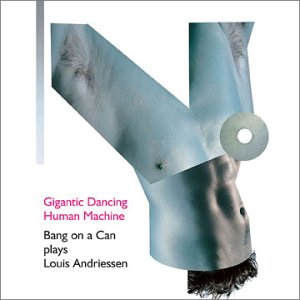
Gigantic Dancing Human Machine Composer: Louis Andriessen Performer: Bang on a Can Cantaloupe Dutch composer Louis Andriessen stands American minimalism on its head with edgy, pulsating works filled with inner drama that are more likely to induce a dancelike rather than trancelike response. The results are exciting, even downright racuous and overpoweringly aggressive. Andriessen is from the what architect Robert Venturi might call the "less is not more, less is a bore" school of composition. Hoketus - the landmark of European minimalism - takes its name from the medieval art of hocketing, splitting a single melody between two groups of instruments separated in space. Earth-shattering and tribal in its elemental power, Andriessen described this piece as a "Gigantic Dancing Human Machine." Its recording is an international collaboration of the Bang on a Can All-Stars, members of London's Icebreaker ensemble, and musicians from Andriessen's own group.
|
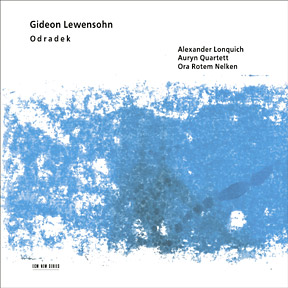
Odradek Composer: Gideon Lewensohn Ecm Records - #461861 The ECM debut of Israeli composer Gideon Lewensohn is an unveiling of an important compositional voice. "Odradek," which apparently doesn't mean anything in any language, is comprised entirely of premiere recordings of pieces that defy categorization. His work is sometimes playful, sometimes serious but always hinting at a beauty too fragile to be long sustained. In his compositions, Lewnsohn pays tribute to Kurtág, Kancheli, Lutoslawski, Shostakovich, Bartók, Mahler, Rochberg, the Hilliard Ensemble, ragtime composer Scott Joplin and many others but in spirit and style his work reminds me most of that of Valentin Silvestrov--music from a strange but beautiful spiritual world of timeless drifting.
|
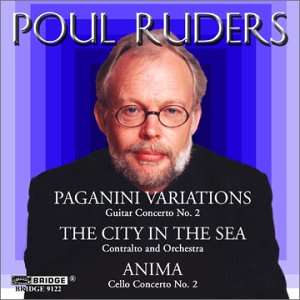
Poul Ruders Edition, Volume 3 - Concerti Composer: Poul Ruders Conductor: David Starobin Performer: David Starobin, Mette Ejsing, et al. Bridge - #9122 Ruders, (b. 1949 in Denmark) will be having a "career" year this season, with new orchestral works due for premiere by the Berlin Philharmonic and The New York Philharmonic. His opera, "The Handmaid's Tale" is set for new productions by the English National Opera (April, 2003) and the Minnesota Opera (May, 2003), and the CD of The Handmaid's Tale received two 2001 Grammy nominations–for "Best Opera"; and "Best Contemporary Composition". This CD features premiere recordings of three Poul Ruders concertos, including Paganini Variations, Ruders's second guitar concerto, a high spirited romp through Paganini's famous 24th Caprice, and a brilliant display vehicle for the brilliant guitarist David Starobin. The City in the Sea is a dramatic setting of Edgar Allan Poe's gothic poem about a lifeless decaying city, sung with enormous power by Mette Ejsing. Anima, Ruders's second cello concerto, is a work of true lyric beauty and is played here by the Czech cello virtuoso, and Tchaikovsky competition prize winner, Michaela Fukacova. |

Orchestral Works Composer:): Bright Sheng Performers: Gondek, Qiang, Wong, Hong Kong Phil Naxos #8555866 Following on to its Michael Torke release last month, Naxos delivers another of the bright young stars of American music. Born in China in 1955, Bright Sheng moved to New York in 1982 to study music at Queens College and Columbia University, George Perle and Leonard Bernstein being among his teachers. Chiina Dreams was composed between 1992 and 1995, and each of the four movements are dedicated to various conductors and orchestras in the States, finally brought together after each of their first performances to form a symphonic suite. Each movement is a vivid and dramatic picture of regions in China; the work's title is taken from the idea for the last movement that came to Sheng in a dream. Though there is a sense of Eastern music, the orchestration is purely from the Western world, and employs a large orchestra. Compelling music, masterfully played. |
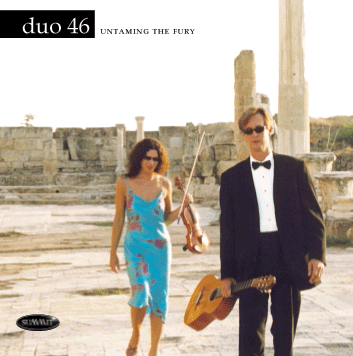
Untaming the Fury New American Music for Guitar and Violin Summit Records SMT-346 As Duo46, guitarist Matt Gould and violinist Beth Ilana Schneider make exciting music together. On this CD, they work their magic on ten pieces specially commissioned from composers who are not household names yet--but all of whom display great potential. Gould and Schneider are polished players who imbue these short works with a full-range of emotional context.
|
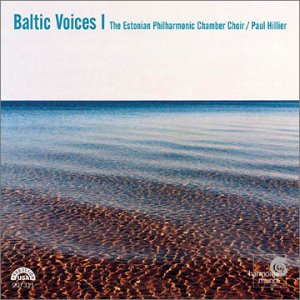
Baltic Voices 1 Composers: Arvo Pärt, Einojuhani Rautavaara, et al. Conductor: Paul Hillier Estonian Philharmonic Chamber Choir Harmonia Mundi Franc - #907311 Paul Hillier leads the Estonian Philharmonic Chamber Choir in Volume 1 of Baltic Voices — a three-year project to explore the choral riches of the Baltic Sea countries. With a special attention to the choir’s native Estonia, these recordings will highlight the mainstream tradition of the past hundred years, complemented with music of earlier periods and commissions from younger composers. Volume 1 features haunting secular and sacred works by 20th-century composers Cyrillus Kreek, Arvo Pärt, Einojuhani Rautavaara, Sven-David Sandstrøm, Peteris Vasks, and Veljo Tormis. Cool, ethereal, other worldly music from a hot bed of great contemporary composers. |

Awakening at the Inn of the Birds, etc. Composer: Michael Byron Performers: FLUX Quartet, Sarah Cahill, Joseph Kubera, and Kathy Supove Cold Blue Music CB0012 Michael Byron blends minimalist and maximalist techniques and rigorous processes with freely composed music to create works that range from the hynotic to the boisterous. Continents of City and Love and Tidal, written 20 years apart, are both arch-form pieces scored for two pianos, synthesizer, string quartet, and doublebass. This new CD collects four of Byron’s very recent works and a new recording of a piece from 1981, all performed by some of today’s most-respected new-music champions, including Sarah Cahill and Joseph Kubera on pianos, Kathleen Supové on synthesizer, and the FLUX Quartet. |

Level 7 Composer: Evan Ziporyn, et al. Performer: The Robin Cox Ensemble The Robin Cox Ensemble is a unique new music group that combines violin, cello, percussion, and live electronics to create vivid performances of new music. In its first three years, this quartet with a one-of-a-kind instrumentation has already staged more forty performances and collaborated with many prominent choreographers and composers, including on this--the group's second CD--the marvelous Evan Ziporyn. |
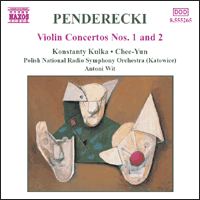
Orchestral Works 4 Composer: Krzysztof Penderecki Peformers: Chee-Yun, violin; Wit, Polish Nat'l Rso, Naxos The two violin concertos presented here are from the 1970s when Penderecki returned from strict modernism to more traditional modes of composition. The first concerto dates from 1977, and was written for Isaac Stern, its solo writing containing prodigious technical difficulties. The second is not much easier but both violinists on this CD produce lively, impressive accounts. |
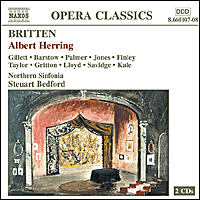
Albert Herring Composer: Benjamin Britten Performer: Bedford, Northern Sinfonia Naxos - In which young Albert Herring, the May King (apparently no female virgin could be found to serve as Queen) is taken into hand by the lovers Sid and Nancy, fortified with rum, and treated to a night on the town where he does--or does not--lose his virtue. Wonderful, gay comedy and beautifully sung. |

Complete Orchestral Works 3 Composer: John Carbon Conductor: Vladimir Valek, Marin Alsop, et al. Mmc Records - #2120 Recent recordings of Carbon's dazzling Violin Concerto, performed by Violinist Peter Zazofsky with Gerhardt Zimmermann conducting the Warsaw National Philharmonic Orchestra; also a marvelous reading by Richard Stoltzman of Carbon's Clarinet Concerto, and Notturno for Trumpet, Harp, and Strings, performed by Gerard Schwarz (with Jeff Silberschlag on trumpet) and the Seattle Symphony. Valuable recording of an unjustly neglected composer. |
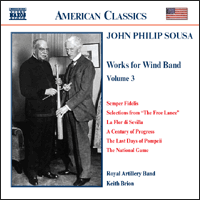
Works for Wind Band 3 Composer: John Philip Sousa Performer(s): Brion, Royal Artillery Band Naxos Born in Washington DC on 6 November, 1854, the father of American march music was the son of a trombonist with the United States Marine Band and a true prodigy. He began music lessons at age six and by the age of eleven he organized and led his own ‘quadrille orchestra’. The rest of his orchestra consisted of seven grown men and quickly became a popular dance orchestra in the Washington area. At the age of 25, he was chosen to become Director of the United States Marine Band in Washington. He began leading the Marine Band in January 1880, beginning a fabled 52 year career as a bandmaster. |
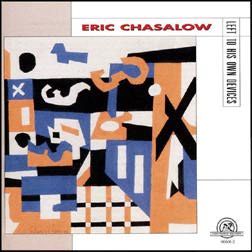
Left to His Own Devices Composer: Eric Chasalow New World Records - #80601 Eric Chasalow is Professor of Composition, and Director of BEAMS, the Brandeis Electro-Acoustic Music Studio. Two of the seven electro-acoustic works on this disc--Left to His Own Devices and Suspicious Motives--pay homage to his Columbia-Princeton mentors; the former is built from vocal samples of Milton Babbitt and the sound of the RCA synthesizer while the latter incorporates two motives from Davidovsky’s music—primarily the opening to Synchronisms #6. Notable also are two purely acoustic chamber pieces, In the Works and Yes, I Really Did, which reveal a consistency of vision across both musical frontiers. |
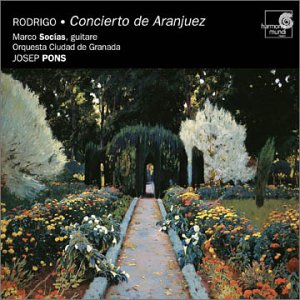
Concierto De Aranjuez / Fantasia Para Gentilhombre Performers: Socias, Pons, Orquesta Ciudad Granada A superb recording of one of the best-known pieces of music of the 20th century. Finished in 1939, the Concierto de Aranjuez made Rodrigo famous overnight. It is presented here with its ideal coupling, the Fantasía para un gentilhombre, along with two much more rarely performed works. The performers here, all of them Spanish, bring an authentically Iberian coloring to these sunny, romantic works.
|
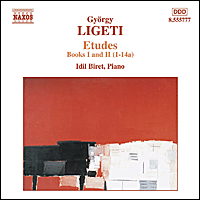
Etudes Books I & II Composer: Gyorgy Ligeti Performer: Idil Biret, piano Naxos - #8555777 Ligeti wrote this series of fifteen studies over a period of ten years beginning in the 1980s and the result is one of its great masterworks of the keyboard. Not for the timid, these pieces take the pianist's skill to levels that border on the impossible. Idil Biret meets the challenges head-on and delivers an extraordinary performance. Highly recommended. |
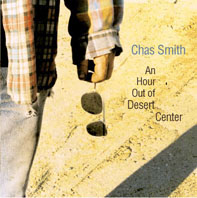
An Hour Out of Desert Center Composer: Chas Smith Cold Blue Music CB0013 Chas Smith is a composer, inventor, instrument builder, and performer from the Harry Partch tradition who creates his own musical world, complete with its own instruments he makes himself or finds. as well as a "language" His is a world of carefully sculpted textures that never sit absolutely still, textures that evolve and are always in the process of a slow change of aural perspective. Critics have frequently compared Smith’s sometimes beautiful, sometimes brooding compositions to those of Ligeti. The three pieces on this new recording feature the composer performing on pedal steel guitars, composer-designed-and-built crotales and sound sculptures, zithers, and a 1948 Bigsby lap guitar. |
 |
Search WWW Search www.sequenza21.com |
